August '25 Monthly Review
This post is a continuation of my series of monthly review posts - what I've been doing and all that kind of good stuff. Other entries in the 2025 series:
August was boiling hot. I don't have the complexion for it. However the month has wrapped up with a notably autumnal feel - the leaves on the tree out front are turning yellow, the spooky stuff is in the shops and the seagull attacks are dying down as the fledglings finally fuck off from their nest down the street.
Travels
I've had a pretty intense month, which is a bit strange when two of those weeks have been Annual Leave from work.
First, a nice holiday with the family over on the western half of the Country. We built some Lego, spent a lot of time in swimming pools and soft plays. We also visited the recently-opened Showtown museum in Blackpool, which is a lovely and accessible venue covering the town's history: the circuses, the comedians, the magic shows, dance halls, the seaside, and the illuminations (!) - it's all there.
As the trains were off on the Bank Holiday weekend, I drove down to London for AEW's Forbidden Door event at the 02 Arena, which was great! Forbidden Door is the company's annual cross-promotion event with the Mexican lucha-libre CMLL promotion and New Japan Pro Wrestling. I felt like a kid again, getting to watch some of the big Japanese names like Tanahashi and Okada wrestle in person. Of course I'm biased, but the typical chants from an American audience are boring and repetitive - the European crowds are simply much better at creating fun chants that are quickly and loudly carried by the entire arena. "Hey, hey Christian (ooh, ahh), I wanna know, if you'll be my dad" and "Swerve's House, in the middle of our street" were my personal faves. There was also the first steel cage match that I've seen in person, a massive ten-person brawl with some of the best to have ever done it.
Media
It will not surprise you, dear reader, that the vast majority of my media consumption this month has been around fanaticism, and ideology, and where this leads.
American Rapture by C.J. Leede
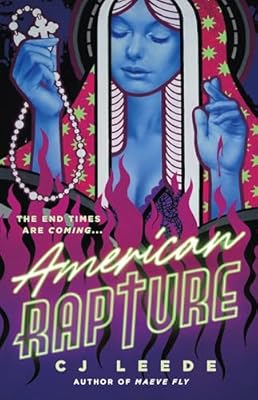
A zombie apocalypse novel, how... novel? Indeed, this is a great one. It's written kinda like a YA novel, but trigger warning, it's pretty dark. These zombies are Rage Virus style zombies, who use sexual assault as a means of infection. Yeah, grim. The main character is from a deeply religious Bible Belt American upbringing, who's lived a sheltered life. Her brother is committed to an institution for coming out as Gay, Her one rebellion is at the library, where the librarian encourages her to read beyond her parent's "approved" list of books. She begins to fall for the librarian's son, and that's when news of the apocalypse begins. The zombies intersect with Sophie's sexual awakening, replacing the repression of her religious community with that of the feral excesses of Americana writ large. Where is God during all of this? The religious communities seem to welcome this purported punishment of the 'sinful'. And so, as Sophie travels the country looking to reunite with her lost brother, Leede interplays the Catholic guilt and religious fanaticism incredibly well. A dark but fantastic piece of storytelling.
Hellblazer, Vol 4: The Family Man by Jamie Delano
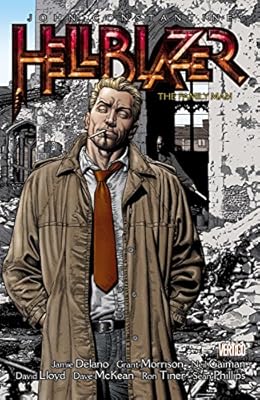
Continuing with my read of Hellblazer from the beginning, part four digs deeper into Constantine as a man, and his familiar ties (and lack of). The story of the 'Family Man' serial killer is done very well, especially given this is a different type of cosmic threat to what Constantine usually faces. I found this collection distinctly more entertaining than the former.
We Need New Stories: Challenging the Toxic Myths Behind Our Age of Discontent by Nesrine Malik
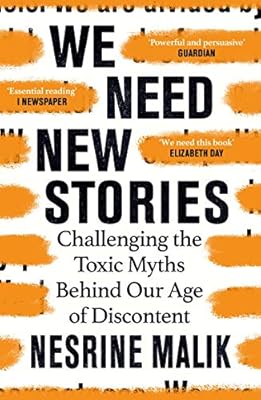
Nesrine Malik, commentator at the Guardian, hits the nail on the head with the title: "We Need New Stories". Nesrine Malik provides insightful analysis on six myths that seek to undermine social justice and social cohesion: in particular, how they perpetuate through bad-faith arguments.
I'll give an example - a classic ideological trap is to make incendiary comments and then fall behind an argument of protection by Free Speech. But even in relatively absolutist free speech countries, there are boundaries. And free speech itself is subject to free speech - people can respond and challenge harmful rhetoric. This is not what these free speech advocates want, though. They'll project outwards and claim
a right-wing labelling of the left as totalitarian in its patrolling of language, thought and by extension ideology.
Even when that's what they want. For their opinions to be dominant, and to be able to be voiced unchallenged.
I learned of the term "Vergangenheitsbewältigung – of coming to terms with the past" through Malik's astute assessment that "Britain did no such thing." And a failure to reconcile with history leads to an exceptionalism ("two world wars and one world cup", as the footie fans say). Where does this lead? Well,
In choosing to ‘leave’ Europe, Britain’s myth of exceptional strength and historical achievement has disconnected it from reality. It is departing a union on the basis that the nation’s success is down to some sort of uniquely magical and virtuous British quality that will subordinate the elements to its will, just as in the past the small island through pluck, bravery and guile took over and ‘civilised’ the world.
We should learn the tactics of the arsonists, those who indulge in:
a sort of cultural pyromania where little fires were ignited here and there and then reported on in feigned shock by the perpetrators.
What I would have liked from this book is more about what these new stories ought to be. Because we are where we are, and good analysis of that state is good, but we need to get to a better place.
Cultish: The Language of Fanaticism by Amanda Montell
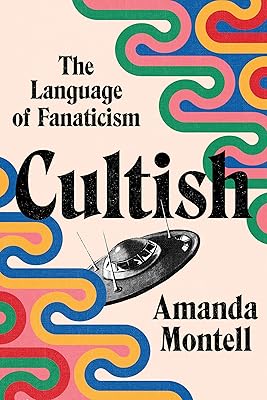
What is it that causes people to fall to the allure of a cult? It's the power of language.
Language is a leader’s charisma. It’s what empowers them to create a mini universe—a system of values and truths—and then compel their followers to heed its rules.
Montell's exploration into various cults - religious, spiritual, fitness, 'brands', multi-level-marketing - looks into the contributing factors that encourages new recruits and embeds them deeper into their shared reality. Through the 'love-bombing' from the leaders and the use of 'thought-terminating cliches' that gazump an individual's skeptical inclinations, to evoking an 'us versus them' mentality that separates participants from non-members, cults create tight, personal bonds that become difficult to break.
The key takeaway here:
speech has meaningful, consequential power to construct and constrain our reality.
The Immortal Life of Henrietta Lacks by Rebecca Skloot
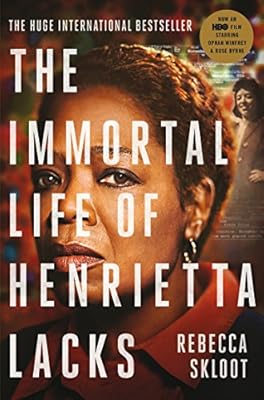
HeLa is an 'immortal' cell line that originated from Henrietta Lacks, a poor, black woman from Baltimore, in the '50s. Lacks died from cervical cancer. During examinations at the hospital, cancerous cells were extracted without consent, in a time of very poor ethical governance. It was discovered that these cells, in the right conditions, demonstrated the remarkable ability to divide indefinitely. These cells have been used to develop the polio vaccine, they've been in space, and continue to be an important resource for biomedical research.
But this book isn't just about the cells. It's primarily about the person, Henrietta, and her story. The HeLa line was misattributed in a 1970s article, so for a long time the lineage wasn't understood in the mainstream. It's also a book about her surviving family, and their trials in recognition for what happened, and how they have (and haven't) coped with this. I'll admit, this is a disturbing read, mixing spiritualism, folk tales, racism and body horror. But it's essential to the story of Henrietta, and what happened to her, what can be learned from this affair. Finally, it is important to recognise the role that Henrietta's cell lineage has played in medical sciences, not just as a biomedical resource, but from the human perspective.
Wordslut: A Feminist Guide to Taking Back the English Language by Amanda Montell

Following on from Cultish I dove into Amanda Montell's previous work, again on language. This book considers linguistics from a feminist perspective - in what ways does language reinforce cultural norms, and how do cultures shape language?
“Language is not always about making an argument or conveying information in the cleanest, simplest way possible. It’s often about building relationships. It’s about making yourself understood and trying to understand someone else.”
Montell explores catcalling - an expression of power and dominance, vocal fry, the usage of Polari as a shibboleth/cant in the Gay community. She looks at gendered language, in the sense of why are boats called 'she', why are the most vulgar swear words that of female genitalia, to how genders in language (i.e masculine, feminine) aren't just Type-A/Type-B 'systems', but also encode and echo norms and biases. There is also some honest commentary around the ideas of reclaiming language, such as the girlboss movement, and how this itself my be harmful and reinforce gender norms, rather than empower.
Unfortunately, this book didn't gel well with me in terms of its presentation. It's written like a transcript of a Youtube video essay, with an over-reliance on a few sources that aren't cited in a bibliography. The content itself is interesting enough, although very oriented to the white American perspective. It's clear that Montell's writing significantly improved with Cultish. That's not to say that this was a bad book, I personally found the narrative voice disjointed.
Rivers of Blood - How Enoch Powell Poisoned Britain by the Origin Story podcast
The Origin Story podcast, hosted by Ian Dunt and Dorian Lynskey, delves in depth into the origins of political figures, ideas and concepts. It stays conversational and accessible but unashamedly liberal in nature. This episode, which I listened to in the car on the way down to London, covers one of the most toxic speeches in British political history, and how Powell got to the position of espousing these views. You still see people claiming the seemingly-prophetic nature of this speech, in an attempt to legitimise hate speech. Looking back, the choice of the word 'poisoned' in the show title is right - for many, this is where it began. It was surprising to hear how well-supported the views were amongst the public, but it was also encouraging to hear the politicians of the time have the conviction to call it what it is: an evil. And despite that popularity, this led Powell to ostracism from mainstream politics, with a leadership bid never coming to fruition. That said, the same ideas are present today, leading in the political polls and dominating debate. This bile became deeply culturally ingrained and has left a long-lasting stain on British politics. It seems once again it must be robustly defeated.
Giants & Monsters by Helloween
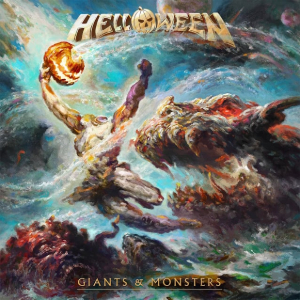
Giants & Monsters is the second Helloween album produced by the Pumpkins United lineup, following their 2021 self-titled work.
I first got into this band around the 2005 release of Keeper of the Seven Keys: The Legacy, which was 20 years after their debut album. It's been another 20 years since, and this current United lineup has been around coming on 10 years. Time baffles me, it really does. I was just a teenager and now I'm closing in on 40, this all seems like 20 minutes ago.
Anyway, this released last Friday and I've gave it a couple of spins since then. Overall I'm enjoying it a lot more than their self-titled (which itself was pretty good). In particular, this has a better balance of the two lead singers (Andi Deris and Michael Kiske), both in terms of them working together, and having strong solo parts. Auxilliary (and original) singer Kai Hansen's vocals are better deployed here too, and I get the impression the band are having a lot more fun with this record than they have in a long time. A certain portion of Internet discourse in the 2000s was arguing about which singer was better, and what I like is the band has taken a "why not both" approach. And why not?! It works.
There's classic euro Power Metal, the genre they bloody well invented. Savior of the World, penned by guitarist Michael Weikath, is majestic. Hearing Kiske soar in this song is joyous, even now his voice is something special. A Little is a Little Too Much, from Deris, brings a hard-rock-inspired pop song that takes inspirations from the band's history - by which I include the likes of Gamma Ray and Pink Cream 69. Deris' vocals stepped up again on this album, and the mix is much better. The clean guitar tones they're experimenting with on this album integrate well into their heavier riffing, Sascha Gerstner has some standout solos, and Markus Grosskopf's thumping basslines are prominent.
40 years into their career, I think it's great this band still have something to give.